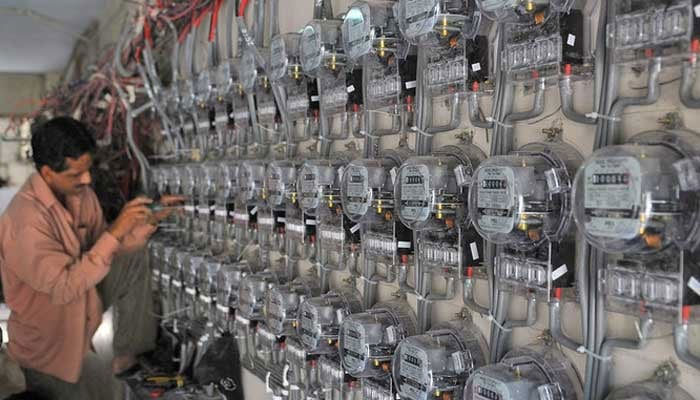CPPA for refunding Rs1.02 per unit in Dec power bills
Nepra has scheduled public hearing on Nov 26 to evaluate whether requested fuel charges variation is justified
ISLAMABAD: Ex-Wapda distribution companies (XWDiscos) have proposed a refund of Rs1.0159 per unit to power consumers in their December 2024 bills, following higher charges levied in previous month of October.
The Central Power Purchasing Agency (CPPA), acting on behalf of these companies, has submitted a petition to National Electric Power Regulatory Authority (Nepra) to finalise the monthly fuel price adjustment (FCA) for October.
Nepra has scheduled a public hearing on November 26 to evaluate whether the requested fuel charges variation is justified, and if companies adhered to economic merit order (EMO) in dispatching power from their plants and private suppliers. If approved, the refund would apply to all categories except lifeline users, domestic consumers using up to 300 units, electric vehicle charging stations, pre-paid electricity consumers across all categories and agricultural consumers. This would mark the fourth consecutive month of FCA reductions after 18 months of consistent increases.
In an earlier decision for July’s FCA, Nepra had asked the Discos to refund Rs0.3692 per unit to consumers in September bills. In August FCA, refunds of Rs0.8555/unit were allowed in October bills. Similarly, for September’s FCA, the refund was Rs1.2754/unit in November bills.
Notably, from January 2023 to June 2024, the FCA remained positive, leading to extra charges for consumers, with the highest adjustment reaching Rs7.056 per unit in January 2024.
The CPPA’s petition reveals reference fuel charges for October 2024 were Rs10.2752 per unit, while the actual costs were Rs9.2593 per unit, resulting in the requested Rs1.0159/unit refund.
According to the CPPA, the reduction is due to variations in the cost of fuel sources used to generate electricity in the month of October 2024.
The fuel charges adjustment request is based on data provided by CPPA, detailing the fuel costs for various electricity generation sources.
According to data, hydel generation continues to be the largest contributor, making up 31.06 percent of total generation. Imported coal-based power accounted for 8.79 percent of the generation mix, with a higher cost of Rs16.9110/kWh.
The share of electricity from indigenous coal stood at 14.79 percent at a cost of Rs11.18 per unit.
As many as 0.02 percent electricity was generated with expensive source of furnace oil at a cost of Rs29.14 per unit.
The share of electricity imported from Iran was 0.41 percent at a cost of Rs25.329 per unit. RLNG (Re-gasified Liquid Natural Gas) also played a significant role, contributing 19.51 percent of the generation at a cost of Rs22.6426/kWh.
The electricity generation through indigenous gas contributed 8.05 percent, at a cost of Rs14.2504/kWh.
Nuclear power was among the least expensive, contributing 14.05 percent of total generation at Rs1.5122/kWh.
Despite these mixed fuel sources, the overall cost of electricity generation for October 2024 came out to Rs9.2593/kWh after adjustments for transmission losses, sales to independent power producers (IPPs), and other factors.
The proposed decrease of Rs1.0159/kWh has been sought against reference price of Rs10.2752/kWh but actual cost stood at Rs9.2593/kWh for XWDiscom consumers.
Nepra has invited all interested to participate in the upcoming hearing scheduled on November 26 and voice their objections or concerns, either in writing or verbal.
The public hearing is a critical step in ensuring transparency and accountability in the adjustment process, and stakeholders are encouraged to engage in the decision-making process.
Following the hearing, Nepra would consider all feedback and make a final decision regarding the proposed fuel charge adjustment.
-
 Princess Beatrice, Eugenie Are ‘not Innocent’ In Epstein Drama
Princess Beatrice, Eugenie Are ‘not Innocent’ In Epstein Drama -
 Reese Witherspoon Goes 'boss' Mode On 'Legally Blonde' Prequel
Reese Witherspoon Goes 'boss' Mode On 'Legally Blonde' Prequel -
 Chris Hemsworth And Elsa Pataky Open Up About Raising Their Three Children In Australia
Chris Hemsworth And Elsa Pataky Open Up About Raising Their Three Children In Australia -
 Record Set Straight On King Charles’ Reason For Financially Supporting Andrew And Not Harry
Record Set Straight On King Charles’ Reason For Financially Supporting Andrew And Not Harry -
 Michael Douglas Breaks Silence On Jack Nicholson's Constant Teasing
Michael Douglas Breaks Silence On Jack Nicholson's Constant Teasing -
 How Prince Edward Was ‘bullied’ By Brother Andrew Mountbatten Windsor
How Prince Edward Was ‘bullied’ By Brother Andrew Mountbatten Windsor -
 'Kryptonite' Singer Brad Arnold Loses Battle With Cancer
'Kryptonite' Singer Brad Arnold Loses Battle With Cancer -
 Gabourey Sidibe Gets Candid About Balancing Motherhood And Career
Gabourey Sidibe Gets Candid About Balancing Motherhood And Career -
 Katherine Schwarzenegger Shares Sweet Detail From Early Romance Days With Chris Pratt
Katherine Schwarzenegger Shares Sweet Detail From Early Romance Days With Chris Pratt -
 Jennifer Hudson Gets Candid About Kelly Clarkson Calling It Day From Her Show
Jennifer Hudson Gets Candid About Kelly Clarkson Calling It Day From Her Show -
 Princess Diana, Sarah Ferguson Intense Rivalry Laid Bare
Princess Diana, Sarah Ferguson Intense Rivalry Laid Bare -
 Shamed Andrew Was With Jeffrey Epstein Night Of Virginia Giuffre Assault
Shamed Andrew Was With Jeffrey Epstein Night Of Virginia Giuffre Assault -
 Shamed Andrew’s Finances Predicted As King ‘will Not Leave Him Alone’
Shamed Andrew’s Finances Predicted As King ‘will Not Leave Him Alone’ -
 Expert Reveals Sarah Ferguson’s Tendencies After Reckless Behavior Over Eugenie ‘comes Home To Roost’
Expert Reveals Sarah Ferguson’s Tendencies After Reckless Behavior Over Eugenie ‘comes Home To Roost’ -
 Bad Bunny Faces Major Rumour About Personal Life Ahead Of Super Bowl Performance
Bad Bunny Faces Major Rumour About Personal Life Ahead Of Super Bowl Performance -
 Sarah Ferguson’s Links To Jeffrey Epstein Get More Entangled As Expert Talks Of A Testimony Call
Sarah Ferguson’s Links To Jeffrey Epstein Get More Entangled As Expert Talks Of A Testimony Call




